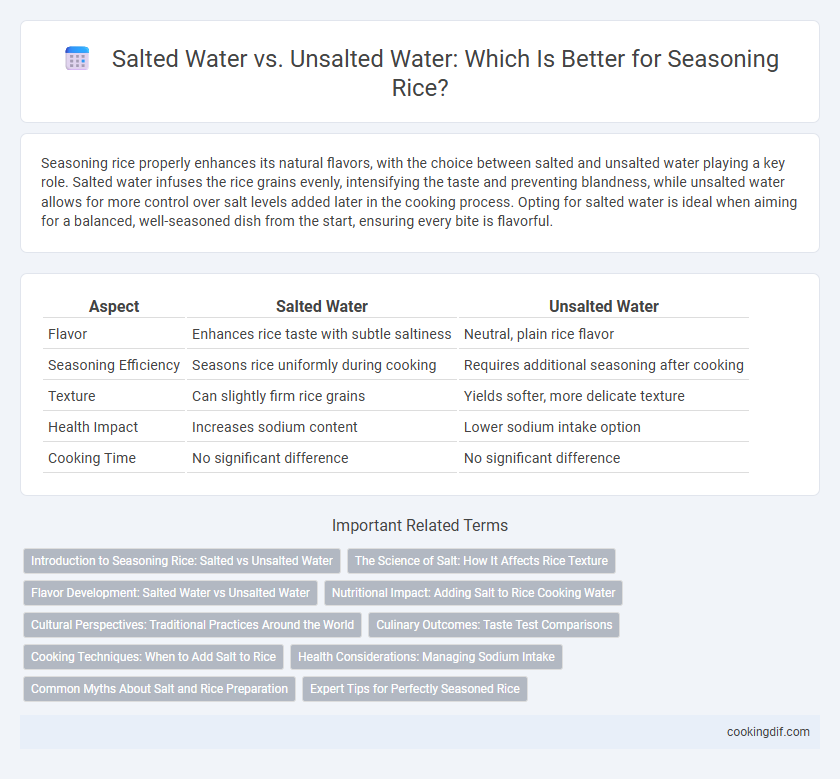Seasoning rice properly enhances its natural flavors, with the choice between salted and unsalted water playing a key role. Salted water infuses the rice grains evenly, intensifying the taste and preventing blandness, while unsalted water allows for more control over salt levels added later in the cooking process. Opting for salted water is ideal when aiming for a balanced, well-seasoned dish from the start, ensuring every bite is flavorful.
Table of Comparison
| Aspect | Salted Water | Unsalted Water |
|---|---|---|
| Flavor | Enhances rice taste with subtle saltiness | Neutral, plain rice flavor |
| Seasoning Efficiency | Seasons rice uniformly during cooking | Requires additional seasoning after cooking |
| Texture | Can slightly firm rice grains | Yields softer, more delicate texture |
| Health Impact | Increases sodium content | Lower sodium intake option |
| Cooking Time | No significant difference | No significant difference |
Introduction to Seasoning Rice: Salted vs Unsalted Water
Using salted water to cook rice enhances its flavor by allowing the grains to absorb salt evenly during the cooking process, resulting in a more balanced and savory taste. Unsalted water preserves the rice's natural flavor, making it a versatile base for dishes where seasoning is controlled or added later. The choice between salted and unsalted water influences the final texture and taste, impacting how rice complements other ingredients in a recipe.
The Science of Salt: How It Affects Rice Texture
Salt influences rice texture by altering the grain's starch structure during cooking, increasing firmness and preventing mushiness. Salted water raises the boiling point, leading to more consistent heat distribution and improved grain separation. The presence of sodium ions also strengthens the outer layer of rice, enhancing chewiness and overall mouthfeel.
Flavor Development: Salted Water vs Unsalted Water
Salted water enhances rice's flavor by allowing salt to penetrate evenly during cooking, resulting in a well-seasoned, balanced taste. Unsalted water leaves rice bland, requiring seasoning post-cooking, which can lead to uneven flavor distribution. The mineral content in salt also influences rice texture, promoting a firmer grain structure that complements flavor development.
Nutritional Impact: Adding Salt to Rice Cooking Water
Adding salt to rice cooking water increases sodium content, which can contribute to higher daily sodium intake and impact blood pressure regulation. Unsalted water preserves the natural flavor of rice while maintaining lower sodium levels, benefiting heart health. Choosing unsalted water supports dietary recommendations to reduce sodium consumption and prevent hypertension.
Cultural Perspectives: Traditional Practices Around the World
In many Asian cultures, rice is traditionally rinsed and cooked in unsalted water to preserve its natural flavor and texture, reflecting an emphasis on purity and subtlety in seasoning. Conversely, some Mediterranean and Middle Eastern traditions incorporate salted water during cooking to enhance the grain's taste and complement rich, savory dishes. These cultural practices highlight diverse approaches to seasoning rice, shaped by regional culinary philosophies and ingredient pairings.
Culinary Outcomes: Taste Test Comparisons
Seasoning rice with salted water enhances the grain's natural flavor by allowing salt to penetrate during cooking, resulting in a more balanced and savory taste. Cooking rice in unsalted water often requires seasoning after cooking, which can lead to uneven flavor distribution and a less cohesive taste profile. Taste tests consistently show rice cooked in salted water achieves superior flavor depth and mouthfeel compared to rice seasoned post-cooking.
Cooking Techniques: When to Add Salt to Rice
Adding salt to the cooking water helps the rice grains absorb seasoning evenly, enhancing flavor from within as they cook. Salted water raises the boiling point, allowing rice to cook slightly faster and with better texture. Unsalted water keeps the rice neutral, so seasoning can be adjusted afterward, ideal when specific salt levels are desired in finished dishes.
Health Considerations: Managing Sodium Intake
Using salted water to cook rice increases the sodium content, potentially impacting blood pressure and cardiovascular health. Unsalted water helps maintain lower sodium levels, aligning with dietary guidelines for managing hypertension and reducing the risk of heart disease. Choosing unsalted water supports better control over daily sodium intake, benefiting overall health.
Common Myths About Salt and Rice Preparation
Many cooks believe that soaking rice in salted water improves flavor, but this myth overlooks the fact that salt primarily seasons the grains during cooking rather than soaking. Salt dissolved in cooking water enhances rice texture by strengthening starch channels, leading to a fluffier final dish. Using unsalted water for soaking does not impact the rice's seasoning as effectively as adding salt directly to the boiling water during the cooking process.
Expert Tips for Perfectly Seasoned Rice
Using salted water to cook rice enhances its natural flavor by allowing the grains to absorb salt evenly during cooking, resulting in perfectly seasoned rice. Experts recommend adding about 1 teaspoon of salt per cup of uncooked rice to achieve balanced seasoning without overpowering the dish. Conversely, cooking rice in unsalted water requires seasoning after cooking, which may lead to uneven flavor distribution and less satisfying results.
Salted Water vs Unsalted Water for seasoning Infographic

 cookingdif.com
cookingdif.com